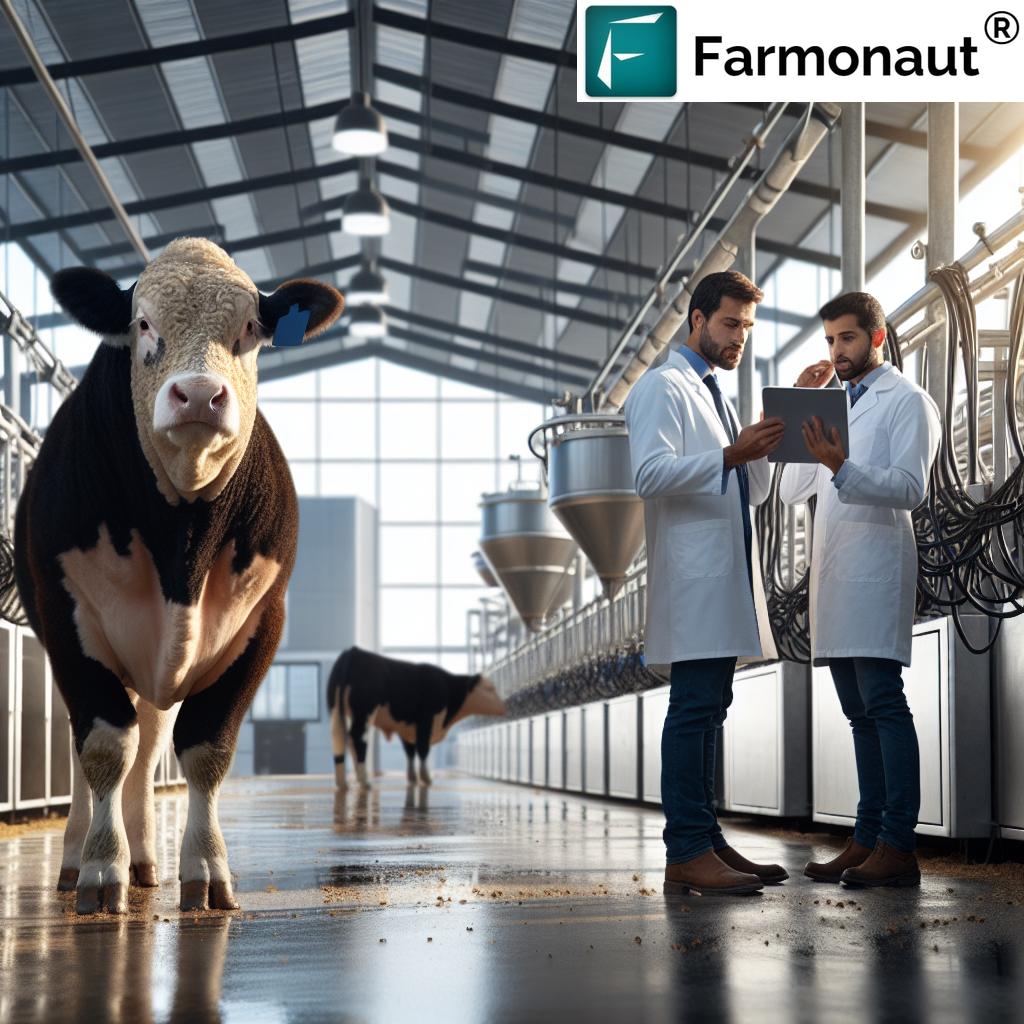10 Essential Tips for Effective Parasite Control in UK Cattle: A Farmer’s Guide to Winter Livestock Management

“Effective parasite control in cattle involves implementing 10 crucial strategies for sustainable livestock management.”
As the winter season approaches, farmers across the UK face the critical challenge of maintaining the health and productivity of their cattle herds. At Farmonaut, we understand the importance of effective parasite control in ensuring the well-being of your livestock and the success of your farming enterprise. In this comprehensive guide, we’ll explore ten essential tips for managing parasites in UK cattle during the winter months, helping you to optimize your livestock management strategies and boost farm productivity.
1. Understand the Parasite Threat in Winter
While many farmers associate parasite problems with the warmer months, winter presents its own unique set of challenges for cattle health. As we house our livestock for extended periods, the risk of certain parasites can actually increase. Understanding these winter-specific threats is crucial for implementing effective control measures.
- Indoor housing can lead to increased exposure to parasites like liver fluke and lungworm
- Stress from confinement and dietary changes can lower cattle’s natural resistance to parasites
- Overcrowding in barns can facilitate the rapid spread of parasitic infections
By recognizing these winter-specific risks, we can tailor our parasite control strategies to address the unique challenges of the season. This knowledge forms the foundation of our approach to maintaining healthy, productive cattle throughout the colder months.
2. Implement Strategic Deworming Protocols
One of the most crucial aspects of effective parasite control in cattle is the implementation of a well-planned deworming strategy. This is particularly important as we transition our herds into winter housing, where parasite populations can quickly escalate if left unchecked.
- Consult with your veterinarian to develop a customized deworming plan
- Consider the specific parasite pressures in your region and on your farm
- Time treatments strategically, often just before or after housing
- Use appropriate products for the parasites you’re targeting
Remember, overuse of dewormers can lead to resistance, so it’s crucial to strike a balance between effective control and sustainable use of these important tools. By working closely with veterinary professionals and utilizing Farmonaut’s advanced farm management solutions, we can develop targeted, effective deworming protocols that protect our cattle without contributing to the growing problem of anthelmintic resistance.
3. Optimize Housing Conditions for Parasite Control
The environment in which we house our cattle during winter plays a significant role in parasite control. By optimizing housing conditions, we can create an environment that is less hospitable to parasites and more conducive to cattle health.
- Ensure proper ventilation to reduce humidity and discourage parasite development
- Maintain clean, dry bedding to minimize contact with parasite eggs and larvae
- Implement regular cleaning and disinfection routines for all housing areas
- Avoid overcrowding, which can increase stress and facilitate parasite transmission
At Farmonaut, we recognize the importance of environmental management in parasite control. Our satellite-based monitoring systems can help farmers track conditions in their livestock housing, ensuring optimal environments for cattle health and productivity. By leveraging technology and best practices in housing management, we can significantly reduce the parasite burden on our herds.
4. Focus on Nutrition for Enhanced Parasite Resistance
Proper nutrition is a cornerstone of effective parasite control in cattle. Well-nourished animals are better equipped to resist and cope with parasitic infections, making nutrition a key component of our winter livestock management strategy.
- Provide a balanced diet rich in essential nutrients, particularly protein and energy
- Consider supplementing with trace minerals like copper and selenium, which play roles in immune function
- Ensure consistent access to clean, fresh water to support overall health and hydration
- Adapt feed rations to meet the increased energy demands of winter
By prioritizing nutrition, we not only support our cattle’s natural defenses against parasites but also promote overall health and productivity. Farmonaut’s AI-driven advisory system, Jeevn AI, can provide valuable insights into optimizing nutritional strategies for your herd, taking into account factors like local conditions and individual farm needs.
“Winter parasite control in UK cattle requires a comprehensive approach covering nutrition, housing, and strategic deworming protocols.”
5. Implement Pasture Management Techniques
While our focus during winter is primarily on housed cattle, effective pasture management remains an important part of year-round parasite control. The steps we take now can significantly impact parasite populations when cattle return to grazing in the spring.
- Rotate pastures to break parasite life cycles
- Consider winter grazing strategies that minimize parasite exposure
- Implement drainage improvements to reduce wet areas where parasites thrive
- Plan for spring grazing, considering which fields pose the lowest parasite risk
Farmonaut’s satellite-based crop health monitoring can be a valuable tool in pasture management, helping farmers identify areas of concern and optimize grazing strategies. By taking a proactive approach to pasture management, even during the winter months, we set the stage for reduced parasite pressure in the coming grazing season.

6. Utilize Diagnostic Tools for Targeted Treatment
In our efforts to control parasites effectively while minimizing the risk of resistance, diagnostic tools play a crucial role. By accurately identifying the specific parasites affecting our herds, we can implement more targeted and efficient treatment strategies.
- Regularly conduct fecal egg counts to assess parasite burden
- Use blood tests to detect liver fluke infections
- Implement strategic sampling to monitor parasite levels across the herd
- Work with veterinarians to interpret diagnostic results and develop targeted treatment plans
At Farmonaut, we understand the value of data-driven decision-making in agriculture. While our platform focuses on crop health and management, the principles of using accurate, timely data to inform farming practices apply equally to livestock management. By integrating diagnostic tools into our parasite control strategies, we can ensure that our treatments are both effective and sustainable.
7. Implement Biosecurity Measures
Effective biosecurity is an often-overlooked aspect of parasite control in cattle. By implementing robust biosecurity measures, we can significantly reduce the risk of introducing new parasites to our herds or exacerbating existing problems.
- Quarantine new animals before introducing them to the main herd
- Implement cleaning and disinfection protocols for visitors and equipment
- Maintain separate equipment for handling feed and manure
- Control wildlife access to cattle housing and feed storage areas
While Farmonaut’s primary focus is on crop management and monitoring, the principles of data-driven decision-making and systematic approach to farm management that we promote are equally applicable to implementing effective biosecurity measures. By treating biosecurity as an integral part of our winter livestock management strategy, we can create an additional layer of protection against parasitic infections.
8. Monitor and Manage Stress Levels
Stress can significantly impact an animal’s ability to resist and cope with parasitic infections. During the winter months, when cattle are housed for extended periods, managing stress becomes particularly important for maintaining herd health and productivity.
- Ensure adequate space and access to feed and water to reduce competition
- Maintain consistent routines to minimize disruptions
- Provide environmental enrichment to alleviate boredom and promote natural behaviors
- Monitor for signs of social stress and adjust groupings as necessary
At Farmonaut, we recognize the importance of holistic farm management. While our platform specializes in crop monitoring and management, the principles of using technology to optimize farm conditions apply across all aspects of agriculture. By leveraging data and insights to create optimal environments for our cattle, we can reduce stress and enhance their natural resistance to parasites.
9. Collaborate with Veterinary Professionals
Effective parasite control in cattle requires a collaborative approach, with veterinary professionals playing a crucial role in developing and implementing successful strategies. Regular consultation with veterinarians ensures that our parasite control measures are both effective and aligned with best practices.
- Schedule regular herd health checks with your veterinarian
- Discuss emerging parasite control strategies and their applicability to your farm
- Seek advice on interpreting diagnostic results and adjusting treatment protocols
- Stay informed about local parasite trends and resistance patterns
While Farmonaut’s expertise lies in providing advanced farm management solutions through satellite technology and AI, we always encourage farmers to work closely with veterinary professionals for livestock health matters. This collaborative approach ensures that technological innovations in farm management complement expert veterinary advice for comprehensive herd health strategies.
10. Embrace Integrated Parasite Management
The most effective approach to parasite control in cattle is an integrated one, combining various strategies to create a comprehensive management plan. This holistic approach not only improves efficacy but also helps to slow the development of parasite resistance to chemical treatments.
- Combine chemical treatments with management practices for optimal control
- Rotate between different classes of anthelmintics to manage resistance
- Incorporate non-chemical control methods, such as grazing management and nutrition
- Continuously monitor and adjust your approach based on herd health and diagnostic results
At Farmonaut, we believe in the power of integrated approaches to farm management. While our focus is on providing cutting-edge solutions for crop monitoring and management, the principle of combining various strategies for optimal results applies equally to parasite control in livestock. By embracing an integrated approach, we can achieve more sustainable and effective parasite management in our cattle herds.
Parasite Control Strategy Comparison Table
| Strategy Name | Target Parasites | Implementation Timing | Estimated Effectiveness (%) | Key Benefits |
|---|---|---|---|---|
| Strategic Deworming | Gastrointestinal worms, Liver fluke | Pre-housing, Mid-winter | 80-90% | Targeted treatment, Reduces resistance risk |
| Nutritional Supplementation | All parasites (indirectly) | Continuous | 60-70% | Enhances natural immunity, Improves overall health |
| Stress Reduction Techniques | All parasites (indirectly) | Continuous | 50-60% | Boosts immune function, Improves welfare |
| Environmental Management | Coccidia, Cryptosporidium | Daily/Weekly | 70-80% | Reduces parasite transmission, Improves hygiene |
| Pasture Rotation | Gastrointestinal worms | Seasonal | 75-85% | Breaks parasite lifecycle, Improves grazing efficiency |
This table provides a quick reference for comparing different parasite control strategies, helping farmers make informed decisions about which methods to implement on their farms. Remember, the most effective approach often involves a combination of these strategies, tailored to your specific farm conditions and herd needs.
Leveraging Technology in Parasite Control
In today’s digital age, technology plays an increasingly important role in all aspects of farm management, including parasite control in livestock. While Farmonaut specializes in satellite-based crop monitoring and management, the principles of using data and technology to improve farm operations apply across the board.
- Use farm management software to track treatments and monitor herd health
- Implement automated monitoring systems for early detection of health issues
- Utilize data analytics to identify trends and optimize treatment strategies
- Explore emerging technologies like precision livestock farming tools
By embracing technological solutions, we can enhance our ability to manage parasites effectively, making more informed decisions and implementing more targeted control measures. While Farmonaut’s focus is on crop management, our commitment to innovation in agriculture extends to supporting farmers in all aspects of their operations, including livestock health.
Explore Farmonaut’s advanced agricultural solutions:
Conclusion: A Holistic Approach to Winter Parasite Control
Effective parasite control in UK cattle during the winter months requires a comprehensive, integrated approach. By implementing these ten essential tips, farmers can significantly reduce the impact of parasites on their herds, improving animal health, welfare, and productivity. From strategic deworming and optimized housing conditions to stress management and collaboration with veterinary professionals, each aspect plays a crucial role in creating a robust parasite control strategy.
As we’ve explored, the key to success lies in combining various approaches, leveraging technology, and staying informed about the latest developments in parasite control. While Farmonaut’s expertise lies in providing cutting-edge solutions for crop monitoring and management, the principles of data-driven decision-making and integrated management strategies apply equally to livestock farming.
By adopting a holistic approach to winter livestock management, incorporating these parasite control strategies, and utilizing available technological tools, UK farmers can ensure their cattle remain healthy and productive throughout the winter season and beyond. Remember, effective parasite control is not just about treating infections; it’s about creating an environment where parasites struggle to thrive and cattle can flourish.
FAQ Section
Q1: How often should I deworm my cattle during winter?
A1: The frequency of deworming depends on various factors, including your herd’s parasite burden, local conditions, and the specific products used. Generally, strategic treatments at housing and mid-winter are common, but always consult with your veterinarian for a tailored plan.
Q2: Can parasites become resistant to dewormers?
A2: Yes, parasite resistance to anthelmintics is a growing concern. To mitigate this, implement integrated parasite management strategies, use diagnostics for targeted treatments, and rotate between different classes of dewormers as advised by your vet.
Q3: How does nutrition affect parasite control in cattle?
A3: Proper nutrition is crucial for enhancing cattle’s natural resistance to parasites. A well-balanced diet, rich in protein and essential minerals, supports the immune system, making animals more resilient to parasitic infections.
Q4: What role does stress play in parasite infections?
A4: Stress can suppress the immune system, making cattle more susceptible to parasitic infections. Minimizing stress through proper housing, good nutrition, and gentle handling can help cattle better resist and cope with parasite challenges.
Q5: How can I monitor the effectiveness of my parasite control strategy?
A5: Regular fecal egg counts, blood tests, and close observation of herd health and performance are key. Work with your veterinarian to establish a monitoring protocol and adjust your strategy based on the results.
By implementing these strategies and staying vigilant, UK farmers can effectively manage parasite control in their cattle herds throughout the winter season. Remember, successful parasite management is an ongoing process that requires attention to detail, adaptability, and a commitment to best practices in livestock care.
For more information on how technology can support your farming operations, explore Farmonaut’s range of agricultural solutions. While our focus is on crop management, the principles of data-driven decision-making and integrated management strategies we promote can be valuable across all aspects of farm management.
Explore our advanced agricultural solutions:
Farmonaut API
API Developer Docs
By embracing a comprehensive approach to parasite control and leveraging available technologies, UK farmers can ensure the health and productivity of their cattle herds throughout the winter months and beyond.
















